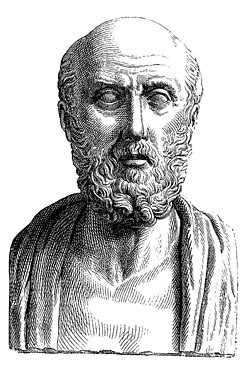
Back Hippokrates Afrikaans Hippokrates von Kos ALS ሂፖክራቴስ Amharic Hipocrates AN हिप्पोक्रेटीस ANP أبقراط Arabic هيبوكراتيس ARZ হিপ'ক্ৰেটিছ Assamese Hipócrates AST हिप्पोक्रेटीस AWA
Hippocrates of Kos | |
|---|---|
 A conventionalized image in a Roman "portrait" bust (19th-century engraving) | |
| Born | c. 460 BC |
| Died | c. 370 BC (aged approximately 90) Larissa, ancient Greece |
| Occupation | Physician |
| Era | Classical Greece |
Hippocrates of Kos (/hɪˈpɒkrətiːz/; Ancient Greek: Ἱπποκράτης ὁ Κῷος, romanized: Hippokrátēs ho Kôios; c. 460 – c. 370 BC), also known as Hippocrates II, was a Greek physician and philosopher of the classical period who is considered one of the most outstanding figures in the history of medicine. He is traditionally referred to as the "Father of Medicine" in recognition of his lasting contributions to the field, such as the use of prognosis and clinical observation, the systematic categorization of diseases, and the (however misguided) formulation of humoral theory. His studies set out the basic ideas of modern-day specialties, including surgery, urology, neurology, acute medicine and orthopedics.[1] The Hippocratic school of medicine revolutionized ancient Greek medicine, establishing it as a discipline distinct from other fields with which it had traditionally been associated (theurgy and philosophy), thus establishing medicine as a profession.[2][3]
However, the achievements of the writers of the Hippocratic Corpus, the practitioners of Hippocratic medicine, and the actions of Hippocrates himself were often conflated; thus very little is known about what Hippocrates actually thought, wrote, and did. Hippocrates is commonly portrayed as the paragon of the ancient physician and credited with coining the Hippocratic Oath, which is still relevant and in use today. He is also credited with greatly advancing the systematic study of clinical medicine, summing up the medical knowledge of previous schools, and prescribing practices for physicians through the Hippocratic Corpus and other works.[2][4]
- ^ Kostakopoulos, Nikolaos A; Bellos, Themistoklis C; Katsimperis, Stamatios; Tzelves, Lazaros (2024-10-01). "Hippocrates of Kos (460-377 BC): The Founder and Pioneer of Clinical Medicine". Cureus. 16 (10): e70602. doi:10.7759/cureus.70602. PMC 11526839. PMID 39483540.
- ^ a b Garrison 1966, pp. 92–93
- ^ Nuland 1988, p. 5
- ^ Garrison 1966, p. 96
© MMXXIII Rich X Search. We shall prevail. All rights reserved. Rich X Search